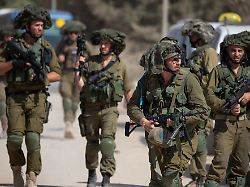20 people arrested
Raid in Hamas deputy chief’s home village
October 21, 2023, 8:43 p.m
Hamas has announced that it will only negotiate the release of Israeli soldiers after the end of the war. Meanwhile, Israel’s army invades the village of Arura, the home of Hamas’ number two, Saleh al-Aruri. His brother and nine of his nephews are taken into custody.
The Israeli army has invaded the home village of the deputy head of the radical Palestinian organization Hamas in the occupied West Bank. Around 20 people were arrested and dozens more questioned, eyewitnesses from Arura reported. Saleh al-Aruri, Hamas’ number two living in Lebanon, comes from the village about 20 kilometers north of Ramallah.
According to the authorities and eyewitnesses, the Israeli army arrested, among others, the brother and nine nephews of the Hamas deputy chief during the dawn raid. The army, for its part, confirmed a deployment in Arura. “Dozens of Hamas members were arrested and questioned.”
Hamas launched a major attack on Israel on October 7th and, according to Israeli sources, killed at least 1,400 people and kidnapped around 200 hostages in the Gaza Strip. In response to the attack, Israel sealed off the Gaza Strip and launched massive airstrikes there. According to Hamas, at least 4,385 people have been killed and 13,561 others injured in the area since the war began.
Hamas calls civilian hostages “guests”
Meanwhile, Hamas announced that it would only negotiate the release of Israeli soldiers after the war. “This issue will not be discussed until the Israeli aggression against the Gaza Strip and the Palestinian people in general ends,” said Osama Hamdan, who also lives in Lebanon. Hamas wants to secure the release of Palestinian prisoners in Israeli prisons.
On the issue of civilian hostages – which he described as “guests” – Hamas is in contact with various countries, including Egypt, Qatar, Iran, Turkey, China and Russia, Hamdan said. Hamas has an interest in the return of the abductees to their home countries, said Hamdan. However, this depends on “security circumstances”.
